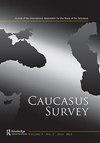亚美尼亚三个共和国:苏联的过去和后苏联亚美尼亚的记忆政治(1991-2018)
IF 0.5
Q3 AREA STUDIES
引用次数: 0
摘要
决定如何与苏联的过去联系起来,是后苏联国家社会和政治精英记忆政治中的一个关键问题。在后苏联时代的几十年里,亚美尼亚的政治和知识精英试图对苏联的过去形成一种复杂的态度,既不拒绝也不完全挪用苏联的遗产,而是在国家历史的范式中吸收它。在这种模式下,苏联亚美尼亚被视为亚美尼亚国家发展的一个阶段,即“第二共和国”,它将1918年至1920年建立民族国家的第一次“尝试”“第一共和国”与“第三共和国”(即后苏联的亚美尼亚国)联系起来。考虑到亚美尼亚历史经验的特殊性(特别是俄罗斯/苏联在亚美尼亚-土耳其关系中所扮演的角色),以及当前的地缘政治环境,这种模式对后苏联时代的亚美尼亚来说是最佳的,亚美尼亚和俄罗斯是正式盟友。这种态度可以被描述为“记忆模糊”,允许断言一个独立主权的亚美尼亚国家是合法的,同时避免与记忆政治领域的盟友发生对抗。本文章由计算机程序翻译,如有差异,请以英文原文为准。
Three Republics of Armenia: The Soviet Past and the Politics of Memory in Post-Soviet Armenia (1991–2018)
Deciding how to relate to the Soviet past is a key question in the politics of memory for the societies and political elites of the post-Soviet countries. Throughout the post-Soviet decades Armenian political and intellectual elites tried to form a complex attitude to the Soviet past, neither rejecting, nor appropriating the Soviet legacy completely, but assimilating it within the paradigm of national history. Within this paradigm Soviet Armenia is viewed as a stage in the development of Armenian nationhood, as “the second republic”, which links the first “attempt” at building a nation-state, “the first republic” of 1918–1920, to the “3rd republic”, i.e. the post-Soviet state of Armenia. This paradigm, in which the Soviet past is neither completely rejected, or accepted, but certain elements of it are integrated into the national history narrative, is optimal for post-Soviet Armenia, given both the peculiarity of Armenia’s historical experience (particularly the role played by Russia/USSR in the context of Armenian-Turkish relations), as well as the current geopolitical setting, in which Armenia and Russia are formal allies. This attitude, which can be described as “mnemonic ambiguity”, allows the assertion of an independent and sovereign Armenian state as legitimate, while at the same time avoiding a confrontation with an ally in the realm of memory politics.
求助全文
通过发布文献求助,成功后即可免费获取论文全文。
去求助
来源期刊

Caucasus Survey
Arts and Humanities-History
CiteScore
1.30
自引率
9.10%
发文量
4
期刊介绍:
Caucasus Survey is a new peer-reviewed, multidisciplinary and independent journal, concerned with the study of the Caucasus – the independent republics of Armenia, Azerbaijan and Georgia, de facto entities in the area and the North Caucasian republics and regions of the Russian Federation. Also covered are issues relating to the Republic of Kalmykia, Crimea, the Cossacks, Nogays, and Caucasian diasporas. Caucasus Survey aims to advance an area studies tradition in the humanities and social sciences about and from the Caucasus, connecting this tradition with core disciplinary concerns in the fields of history, political science, sociology, anthropology, cultural and religious studies, economics, political geography and demography, security, war and peace studies, and social psychology. Research enhancing understanding of the region’s conflicts and relations between the Russian Federation and the Caucasus, internationally and domestically with regard to the North Caucasus, features high in our concerns.
 求助内容:
求助内容: 应助结果提醒方式:
应助结果提醒方式:


